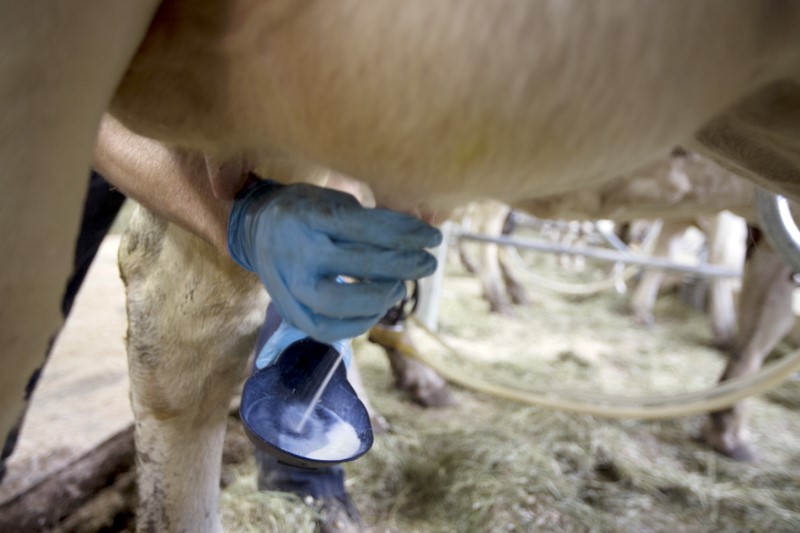By David Ljunggren and Rod Nickel
OTTAWA/WINNIPEG (Reuters) - The U.S. dairy lobby is ratcheting up the pressure on Canada as talks to renegotiate NAFTA draw closer, demanding concessions the Canadian government looks unwilling to grant, according to people familiar with the file.
The result could be a brawl that sours efforts to modernize the North American Free Trade Agreement, under which Canada sends most of its exports to the United States. Mexico is the pact's third member.
U.S. farmers have long chafed about supply management, the term for Canada's system of tariffs and quotas to keep domestic prices high and imports low. A 2016 deal that allowed Canadian farmers to sell milk proteins to domestic processors at a discount, curbing the flow of American imports, further raised their ire.
Jaime Castaneda, senior vice-president for the U.S. Dairy Export Council, said the influential lobby group will pursue fresh challenges through the World Trade Organization unless Canada stops the proteins sale.
"If we can't resolve this through negotiations, I believe my members will be very clear that everything is on the table," he said in a phone interview.
A WTO panel ruled in 2002 that Canada breached its trade obligations through illegal subsidies to its dairy industry, siding with the United States. The U.S. and Canada reached a settlement in 2003.
Castaneda said challenges against the protein sales could eventually result in rulings that force Canada to ditch supply management.
In June, U.S. agriculture secretary Sonny Perdue said he would prefer to address dairy irritants before NAFTA talks begin and said supply management was fine as long as though it did not harm the U.S. industry.
But on July 14 he appeared to toughen his stance, saying through a spokeswoman he felt "all options should be on the table" in the NAFTA talks and that dairy remained a concern.
Although dairy was originally excluded from the original 1994 deal, the United States may push for it to be part of the talks on a new pact.
"I don't see why it wouldn't be, when you're looking at an overall trading relationship ... there is no doubt in my mind that it would be on the table," said one person familiar with Washington's approach.
Despite the more strident U.S. line, Prime Minister Justin Trudeau's government has little interest in compromise.
"We are fully trade compliant and trade in dairy products massively favors the United States," said a Canadian government source.
Canada's dairy sector includes C$6 billion ($4.8 billion) in annual farmer milk sales.
Fearing the domestic industry's lobbying muscle, Canadian politicians of all stripes mostly treat dairy as a sacred cow.
In May, dairy farmers helped ensure the defeat of a Conservative party leader candidate who advocated eliminating supply management.
"Dairy farmers are a force to be reckoned with. I think (politicians) will do well to listen to our concerns," said Manitoba dairy farmer David Wiens, an executive of the influential Dairy Farmers of Canada.
Dairy is one of several commodities, including lumber and wine, that have sparked complaints by the Trump administration leading into NAFTA talks. U.S. President Donald Trump said in April he would stand up for domestic dairy farmers against what he called unfair Canadian practices.
The American side also wants Canada to start cutting tariffs to allow more imports. As part of the talks on a proposed 12-nation Pacific trade treaty in 2015, Canada agreed to open up 3.25 percent annually of its dairy supply.
That treaty was still-born and any talk of concessions is now off the table.

"The industry is not prepared to give any additional access to the Canadian market," said Yves Leduc, head of government relations at the Dairy Farmers of Canada lobby group.